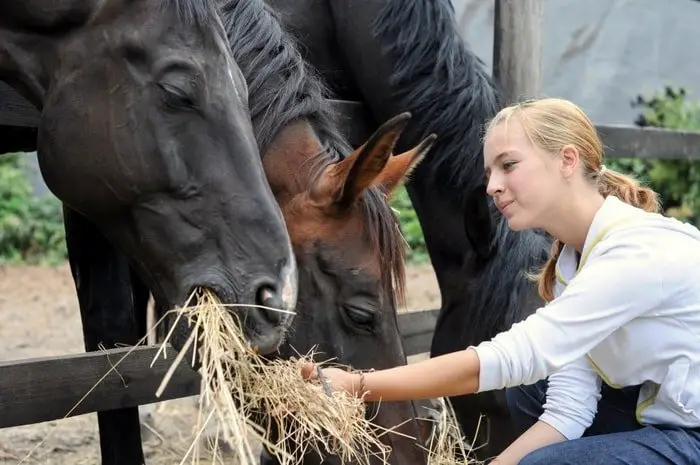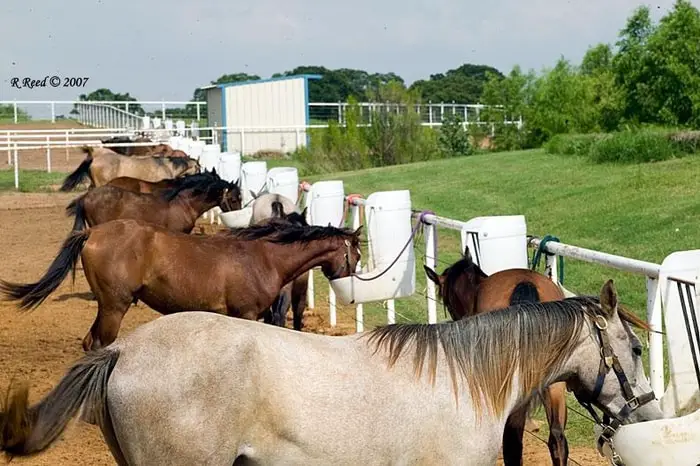A ration balancer for horses is a type of horse feed or supplement designed to provide essential nutrients in a concentrated form while minimizing calorie intake. It is primarily used for horses that require specific nutrients to maintain optimal health and performance but do not need additional calories from traditional grain-based feeds like oats or corn.
Ration balancers typically come in pelleted or granulated forms and contain a concentrated blend of vitamins, minerals, amino acids, and other essential nutrients. They are formulated to meet the horse’s basic nutritional requirements without the excess carbohydrates and calories in traditional grain-based feeds.
When feeding a ration balancer, following the manufacturer’s guidelines and considering the horse’s specific needs, such as age, activity level, and any dietary sensitivities, is essential. Some ration balancers are formulated for specific purposes, like supporting hoof health or promoting muscle development, so selecting the appropriate product is essential.
9 Types of Rations Balancer for Horses
Ration balancers for horses come in various types and formulations to address specific dietary needs and conditions. Here are some common types of ration balancers:
- General Ration Balancers: These are designed to provide a balanced profile of essential nutrients, including vitamins, minerals, amino acids, and sometimes added Omega-3 fatty acids. They are suitable for horses with average energy requirements and are often fed to maintain overall health and well-being.
- Low-Starch Ration Balancers: These are formulated for horses sensitive to starch and sugars, such as those with conditions like equine metabolic syndrome (EMS) or laminitis. They contain minimal starch and sugar content to help manage these conditions.
- Senior Ration Balancers: Specifically tailored for older horses, senior ration balancers provide nutrients that support aging horses’ health. They may include joint-supporting ingredients like glucosamine and chondroitin and may be more easily digestible for aging digestive systems.
- Performance Ration Balancers: Designed for horses in regular work or with high energy demands, performance ration balancers provide additional amino acids and nutrients needed for muscle development and maintenance. They are suitable for sport horses and working horses.
- Growth Ration Balancers: These are formulated for young, growing horses, including foals, weanlings, and yearlings. Growth ration balancers provide the nutrients required for proper bone and muscle development.
- Weight Management Ration Balancers: These are intended for horses that need to lose or maintain weight without receiving excess calories. They are often used for “easy keepers” or horses prone to obesity. These balancers provide essential nutrients without the added energy from grains.
- Specialized Ration Balancers: Some ration balancers are tailored to address specific issues or requirements, such as promoting healthy hooves, managing skin and coat conditions, or supporting horses with specific allergies or sensitivities.
- Forage-Only Ration Balancers: These are designed for horses that primarily consume forage (hay or pasture) and require supplementation to balance their diet. Forage-only ration balancers ensure that horses receive essential nutrients even when their forage may be lacking in certain aspects.
- Nutritional Supplements: Besides traditional ration balancers, various equine nutritional supplements can be added to a horse’s diet to address specific deficiencies or health concerns. These supplements may include vitamins, minerals, joint support products, etc.
What Does a Ration Balancer Do for Horses?
A ration balancer for horses serves several essential functions in a horse’s diet, depending on the specific type and formulation. Here’s what a ration balancer does for horses:
- Balances Essential Nutrients: Ration balancers are formulated to provide a concentrated source of essential nutrients, including vitamins, minerals, amino acids, and sometimes fatty acids. They are designed to fill nutrient gaps in a horse’s diet and ensure the horse receives all the necessary building blocks for overall health and well-being.
- Meets Nutritional Requirements: Ration balancers are carefully formulated to meet a horse’s specific nutritional requirements without providing excess calories. This is especially useful for horses that are easy keepers or those on restricted diets where calorie intake needs to be controlled.
- Supports General Health: A ration balancer helps support a horse’s overall health by providing a balanced array of nutrients. This includes promoting healthy coat and skin, strong hooves, proper muscle development, and efficient immune function.
- Manages Weight: Ration balancers are an excellent option for managing a horse’s weight. They allow horse owners to provide essential nutrients without overloading the horse with calories. This is particularly beneficial for horses prone to obesity or metabolic conditions.
- Tailored Formulations: Different ration balancers are available to address specific needs, such as low-starch options for horses with metabolic issues, senior formulations for aging horses, and performance balancers for active horses. This allows horse owners to select the appropriate ration balancer for their circumstances.
- Supports Growth and Development: Growth ration balancers are formulated to fulfill the individual nutritional needs of young, growing horses. They provide the essential building blocks necessary for proper bone and muscle development.
- Compensation for Forage Deficiencies: Forage-only ration balancers complement a diet primarily based on hay or pasture. They ensure horses receive all the necessary nutrients, even when the forage lacks specific vitamins or minerals.
- Addressing Special Dietary Requirements: Some horses have special dietary requirements or sensitivities. Specialized ration balancers are available to meet these needs, such as those formulated for horses with allergies, skin conditions, or digestive sensitivities.
- Cost-Efficient Nutrition: Ration balancers are a cost-effective way to provide essential nutrients to horses, as they are highly concentrated and typically require smaller feeding amounts than traditional grain-based feeds.
What is the Difference Between a Complete Feed and a Ration Balancer?
Complete feed and ration balancer are two distinct types of horse feed, and they serve different purposes in a horse’s diet. Here are the key differences between them:
Complete Feed:
- Total Nutrition: A complete feed is a type of horse feed that contains all the necessary nutrients, including fiber, protein, vitamins, and minerals, required to meet a horse’s daily dietary needs. It is designed to be the sole source of nutrition for horses.
- High Caloric Content: Complete feeds are calorie-dense and provide a significant portion of a horse’s daily energy requirements. They are often fed to horses with higher energy needs, such as working horses or those in heavy training.
- Feed Volume: Horses consume complete feeds in larger quantities than ration balancers. This is because they need to eat more to meet their energy requirements.
- Hay Replacement: Complete feeds can replace some or all of a horse’s forage (hay or pasture) intake. They are often used when high-quality forage is scarce, or horses need help chewing or digesting hay.
- Simplicity of Feeding: A complete feed can be straightforward because it is designed to provide everything a horse needs in one product. However, monitoring a horse’s body condition and adjusting the feeding rate is essential to prevent overfeeding or underfeeding.
Ration Balancer:
- Concentrated Nutrition: A ration balancer is a highly concentrated horse feed or supplement formulated to provide essential nutrients, including minerals, vitamins, amino acids, and sometimes fatty acids, without adding many calories. It is not meant to provide most of a horse’s energy needs.
- Low Caloric Content: Ration balancers are low in calories, making them suitable for horses that do not require additional energy from their feed. They are often fed in smaller quantities compared to complete feeds.
- Supplemental Role: Ration balancers are typically used to supplement a horse’s diet, especially when the horse is already receiving adequate calories from forage or other sources. They help fill nutrient gaps and ensure a balanced diet.
- Specialized Formulations: Ration balancers come in various specialized formulations to address specific needs, such as low-starch options for horses with metabolic conditions, senior formulations, or those designed for specific life stages or health concerns.
- Balancing Nutrient Deficiencies: Ration balancers are valuable for compensating for nutrient deficiencies in a horse’s forage or pasture, ensuring that the horse receives all the nutrients required for health.
Cost Effectiveness of Equine Ration Balancer
The cost-effectiveness of using an equine ration balancer depends on several factors, including the specific needs of your horse, your feeding program, and the prices of available feeds and supplements. Here are some considerations to help you evaluate the cost-effectiveness of using a ration balancer for your horse:
- Horse’s Nutritional Needs: Consider your horse’s age, activity level, health, and dietary requirements. If your horse has specific nutritional needs or dietary restrictions, a ration balancer that provides targeted nutrients may be more cost-effective than purchasing multiple supplements separately.
- Caloric Requirements: Ration balancers are generally lower in calories than traditional grain-based or complete feeds. Suppose your horse has low energy requirements and maintains weight well on forage alone. In that case, a ration balancer can be a cost-effective way to provide essential nutrients without adding excess calories.
- Forage Quality: Evaluate the quality of the forage (hay or pasture) your horse consumes. Suppose your forage is nutritionally deficient in certain vitamins or minerals. In that case, a ration balancer can help balance the diet and may be more cost-effective than upgrading to higher-quality forage.
- Feeding Rate: Ration balancers are highly concentrated, so horses typically require smaller quantities than complete feeds. This can be cost-effective, as a bag of ration balancers may last longer than a bag of complete feed.
- Supplement Costs: Compare the cost of purchasing individual supplements (such as vitamin and mineral supplements, amino acids, or joint supplements) versus using a ration balancer that combines these nutrients in one product. Sometimes, a ration balancer may offer cost savings by reducing the number of individual supplements needed.
- Feeding Simplicity: Consider the convenience of feeding a single product (ration balancer) versus multiple supplements. Feeding a ration balancer can simplify your horse’s diet and reduce the chances of errors in supplementing.
- Horse Health and Performance: If your horse’s health and performance improve on a balanced diet provided by a ration balancer, it can be cost-effective in the long run by potentially reducing veterinary costs and improving your horse’s overall well-being.
- Price Comparison: Compare the cost per serving of a ration balancer to other feeds or supplements available in your area. Remember that while ration balancers may seem more expensive upfront, they are highly concentrated, and the cost per serving may be competitive with other options.
- Consult with a Nutritionist: If you need clarification on the cost-effectiveness of using a ration balancer for your horse, consider consulting with an equine nutritionist or veterinarian. They can help you assess your horse’s needs and recommend the most cost-effective feeding program.
Nutritional Facts of Ration Balancer for Horses
The nutritional facts of a ration balancer for horses vary depending on the product’s brand, formulation and intended use. However, I can provide a general overview of the typical nutritional components you might find in a ration balancer:
- Protein: Ration balancers typically contain more protein than traditional grain-based feeds. The protein content can range from 25% to 35% or more, depending on the formulation. The protein comes from various sources, including soybean meal, alfalfa meal, and other plant-based ingredients.
- Fiber: Ration balancers often contain moderate to high fiber levels to mimic a horse’s natural forage intake. Fiber content may range from 10% to 20% or more. Fiber sources include beet pulp, soybean hulls, and other plant fibers.
- Vitamins and Minerals: Ration balancers are designed to be nutritionally balanced and provide vital vitamins and minerals. They typically contain a comprehensive blend of vitamins (e.g., vitamin A, vitamin D, vitamin E) and minerals (e.g., calcium, phosphorus, magnesium, zinc, copper) to meet a horse’s requirements.
- Amino Acids: Amino acids are the building blocks of protein, and ration balancers often include specific amino acids like lysine and methionine to support muscle development and overall health.
- Fatty Acids: Some ration balancers include omega-3 fatty acids, which can contribute to a healthy coat and skin. Sources of these fatty acids may include flaxseed or other oilseeds.
- Carbohydrates: Ration balancers are generally low in carbohydrates compared to grain-based feeds. They are designed to provide minimal calories to horses while focusing on nutrient density.
- Starch and Sugar: Many ration balancers are formulated low in starch and sugar, making them suitable for horses with metabolic conditions like insulin resistance or laminitis.
- Energy Content: Ration balancers are intentionally low in energy (calories) compared to complete feeds or grains. They are designed to provide necessary nutrients without adding excess calories to the horse’s diet.
- Specialized Ingredients: Depending on the specific formulation, ration balancers may contain additional ingredients to address particular needs. For example, some may include joint supplements, prebiotics, or probiotics.
Concluding Remarks on Ration Balancer for Horses
Remember that while ration balancers can be a valuable part of a horse’s diet, they should not be the sole source of nutrition for horses with high energy demands, such as performance horses or lactating mares. These horses may require additional calories from grains or concentrates to meet their energy requirements. Consulting with a veterinarian or equine nutritionist can help determine the best feeding plan for your horse’s needs.
In summary, a ration balancer is crucial in providing balanced nutrition to horses while minimizing calorie intake. It helps ensure that horses receive all the essential nutrients to support their health and well-being, making it a valuable component of a horse’s diet, especially for those with specific dietary requirements or weight management needs.


